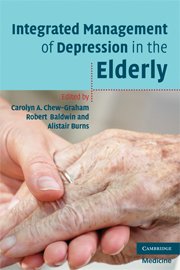Book contents
- Frontmatter
- Contents
- Contributors
- Foreword
- Preface
- Acknowledgements
- 1 Late-life depression: an introduction
- 2 Management of late-life depression
- 3 Management of late-life depression in primary care: case studies UK
- 4 Management of more complicated depression in primary care: case studies UK
- 5 Management of late-life depression across primary and secondary care: case studies UK
- 6 Management of late-life depression around the world: summary of international commentaries
- 7 Resources
- Appendix: International commentaries
- Index
Foreword
Published online by Cambridge University Press: 18 December 2009
- Frontmatter
- Contents
- Contributors
- Foreword
- Preface
- Acknowledgements
- 1 Late-life depression: an introduction
- 2 Management of late-life depression
- 3 Management of late-life depression in primary care: case studies UK
- 4 Management of more complicated depression in primary care: case studies UK
- 5 Management of late-life depression across primary and secondary care: case studies UK
- 6 Management of late-life depression around the world: summary of international commentaries
- 7 Resources
- Appendix: International commentaries
- Index
Summary
To my knowledge there is nothing quite like this book in the English language, perhaps in any language. This is not to say late-life depression has not been the focus of previous books. Felix Post, in 1962, published the results from his clinical follow-up of late-life depression in what I believe was the first text for physicians on the symptoms and course of this common condition written in the twentieth century. I attempted a general overview of the topic twenty years later, summarizing the extant literature and coupling this review with my own experience in treating depressed older adults. The National Institutes of Mental Health in the United States convened a consensus panel a little over a decade later that lead to a detailed literature review and recommendations for clinical investigators, recommendations that have spawned a plethora of research reports over the past decade. There have been many other single-authored and edited textbooks since.
What makes this book different? Is this difference of use to practitioners? Unlike anything written to date, the editors have derived their primary data from the most important source for truly grasping the nature of late life depression and entering the complex task of designing and implementing a treatment plan. That source is the collection of practitioners ‘on the ground’ working with depressed older adults daily, beginning not with the psychiatrist or psychologist but with the primary care physician/general practitioner.
- Type
- Chapter
- Information
- Integrated Management of Depression in the Elderly , pp. xiii - xivPublisher: Cambridge University PressPrint publication year: 2008

